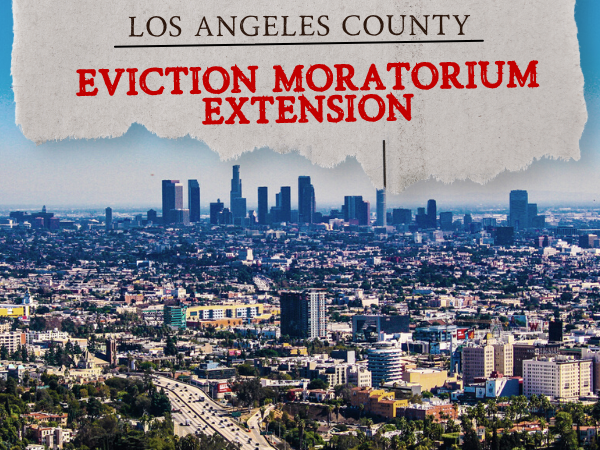Los Angeles Countywide Eviction Moratorium Extended Into 2023

Supervisor Barger Stood Firm in Her Opposition!
On January 25th, by a 4-1 vote with Supervisor Barger strongly opposing, the Los Angeles County Board of Supervisors adopted an extension and expansion to the Countywide, applicable to the unincorporated areas and incorporated cities, eviction moratorium provisions into 2023. In addition, the rent increase freeze which applies to rent stabilized units within the County’s unincorporated areas was also extended. The Apartment Association of Greater Los Angeles strongly advocated against the County’s action and called for the eviction moratorium and rent increase freeze to end.
We encourage members to review the full details of the County’s resolution, click on the button below and to consult with an attorney if you have any questions regarding your property or specific tenancies and the applicability of the County’s eviction moratorium and/or rent increase freeze.
The County’s eviction moratorium was established in March 2020, as an interim emergency measure necessitated by a global pandemic and government mandated stay at home orders that resulted in business shutdowns and escalating unemployment. Nearly two years later, these measures can no longer be characterized as temporary. Moreover, in light of the Board of Supervisors actions this week, the eviction moratorium will remain in effect to some extent through June 30, 2023!
The circumstances of today are vastly different than what existed in March 2020 and so should the regulations that are advanced. A sentiment that was emphatically expressed by Supervisor Barger during the Board meeting as she highlighted the significant 78% full vaccination rate among Los Angeles County residents, the extent to which business sectors have resumed operations and the upcoming Super Bowl to be held in Los Angeles which further illustrates the degree to which circumstances have dramatically changed.
Summary of Three Phase Plan
The Board of Supervisors adopted a three-phase plan covering the period of February 1, 2022 through June 30, 2023.
In the first phase, from February 1 through May 31, 2022, the current prohibitions will remain unchanged, prohibiting evictions based on nuisance, unauthorized occupants and pets whose presence is necessitated by or related to the COVID-19 emergency, a renter’s denial of entry to the housing provider, and no-fault evictions with a very limited allowance for an owner or the owner’s family member to move-in to their single-family home, mobilehome space, condominium unit, duplex or triplex and only after specific conditions and requirements have been met. In addition, during Phase 1 beginning on April 1, 2022, the prohibition on evictions based on non-payment of rent is reinstated, where the renter self certifies that they are unable to pay rent due to financial impacts of COVID-19 for rent incurred from April 1, 2022 through May 31, 2022. It is important to note that through March 31, 2022, the state law governs. At this juncture, there is simply no basis for the County to not require that renters provide rental housing providers with supporting documentation as proof of COVID-19 related financial hardship and income level when such documentation is required to receive government financial assistance.
During Phase 1, the rent increase freeze which applies to rent stabilized units within the County’s unincorporated areas also remains in effect.
In Phase 2, from June 1 through December 31, 2022, no-fault evictions continue to be prohibited with modifications to some of the conditions related to owner/owner family member move-in but for the most part strict requirements remain in place. The prohibition on evictions based on denial of entry are no longer in effect, “except where a landlord’s attempts to enter the rental unit constitute harassment.” During this time period, non-payment of rent provisions are now limited to renters with a household income of 80% Area Median Income (AMI) and again, the renter need only self-certify their income level and inability to pay rent due to financial impact of COVID-19. The prohibitions on evictions based on nuisance and unauthorized occupants and pets remain in effect. The rent increase freeze for rent stabilized units in the County’s unincorporated areas also remain in effect.
In Phase 3, from January 1 through June 30, 2023, most of the provisions are lifted, however, some protections remain in place for renters that self-certify that their household income level is 80% AMI or below and of their COVID-19 financial hardship. The motion leaves the door open stating “all other eviction protections for residential tenants would be lifted, unless the Board considers options for extending eviction protections for tenants who have had to house unauthorized occupants or pets.”
During the course of the Board of Supervisor’s deliberations, Supervisor Barger advanced a motion, co-authored by Supervisor Hahn, to offer rental housing providers financial support. The motion explores the feasibility of forgiving or deferring property tax payments for rental housing providers who are unable to collect rent from renters, directs staff to review what other localities have done to assist owners and should the County’s authority be limited to advocate at the State level for the State to provide housing providers with such financial support.
Supervisor Barger vocalized her opposition to the extension and basis for her motion, stating that “It has become clear to me that our County does not have enough skin in this game.” “This Board is asking landlords to shoulder a burden for those who have been impacted by COVID-19. We should also be willing to bear the same burden.” Following the Board meeting, the Association released a statement, “We thank Supervisor Kathryn Barger for standing alone in support of the County’s housing providers and advocating for more balanced, long-term solutions.”
This article is for informational purposes only. If you have any questions regarding your property or specific tenancies and the requirements of any local law changes described herein, please consult with an attorney.
